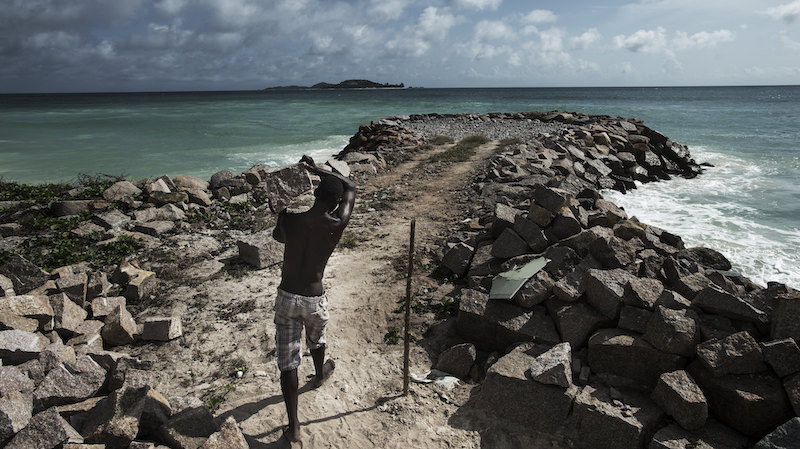As years-long negotiations over boosting global efforts to adapt to climate change enter the final stretch, countries are still divided over targets and the funding to achieve them.
At Cop28 next month, governments are expected to approve a framework to make the Paris Agreement’s global goal on adaptation (GGA) more concrete. The initiative is aimed at enhancing nations’ resilience to extreme weather events, flooding, droughts and sea level rise.
Adaptation is one of the key priorities of the Paris Agreement, alongside emission reductions. But challenges in defining, measuring and funding action on this front have held back progress at the same time as climate risks are accelerating.
Two years ago, at Cop26, countries agreed to a two-year work programme to fill this gap. Developing countries most affected by climate change hoped this would unlock finance to reduce their vulnerability.
Widening finance gap
Developing countries need an estimated $387 billion a year to carry out their current adaptation plans, but in 2021 they only received $21 billion in international adaptation finance, according to a recent report by the UN Environment Programme (UNEP).
“We have seen a reduction in finance and a stalling of flows for adaptation initiatives,” UNEP’s chief scientist Dr. Andrea Hinwood told Climate Home. “We really must act now. It’s only with fast, urgent, consolidated action with appropriate finance flows that we have a chance to address those issues.”
World Bank to initially host loss and damage fund under draft deal
Money is a sticking point in negotiations over the adaptation framework.
Developing countries want the agreement to tackle the question of finance directly, ideally with a dedicated target. On the other hand, developed countries, which would be called upon to foot the bill, oppose any mention of money in the text.
Money struggles
Disagreements nearly sunk talks over the framework in Bonn last June, before being rescued in the eleventh hour. Four months later, as negotiators met for one last time before Cop28, fundamental divisions remained.
The African group proposed the inclusion of a target for the funding of “at least 80% of expressed needs by developing countries” with the size of adaptation finance reaching at least $400bn annually by 2030.
A proposal by China on behalf of the “like-minded group” of developing countries says the framework should require developed countries to provide developing countries with “long-term, scaled-up, predictable, new and additional finance”.

A girl fetches water by digging a hole in a dried up waterbed during a drought in Somalia (Photo: UNDP Somalia/Flickr)
A developed country negotiator told Climate Home they “cannot live” with any references to finance in the framework.
“We want to discuss the substance and not the money. We don’t see the GGA framework as the space to talk about a new climate finance target for adaptation,” they said. “Adaptation finance will be addressed somewhere else and will enable the framework to be effective.”
The European Union suggested in its latest proposal that the role of finance in delivering the targets could be referenced in a decision text outside of the framework.
But developing countries fear that approving a set of actions without clear indications within the text of how to fund them would lead to an “empty framework”.
Lisa Yassin, a negotiator from the group of least developed countries, told Climate Home “it is critical” the question of finance is addressed within the framework.
“It ensures a commitment to ongoing and enhanced funding that is directly responsive to the needs outlined within the framework’s targets,” she said. “It also guarantees its centrality and better accountability beyond Cop28.”
Broken promises
Fuelling divisions is a deepening distrust by developing countries over rich nations’ failure to cough up cash promised for climate action. Developed countries have still not made good on a 2009 pledge to collectively provide $100bn a year by 2020 to help developing countries cut their emissions and adapt to climate impacts.
They are also off track to meet a promise made at Cop26 to double the adaptation finance for developing countries to around $40 billion by 2025. Adaptation public finance flows to developing countries declined by 15% in 2021 to $21 billion, according to UNEP.
Richard Klein, senior research fellow at the Stockholm Environment Institute, expects “a very difficult conversation” about adaptation finance at Cop28. “If trust and confidence were there that there will be enough money on the table, the question of money under the GGA framework would have not been that crucial. But everybody sees that is not the case,” he added.
Numbers vs high-level targets
Money is not the only dividing line in talks over the adaptation framework. Governments are also split over the wider set of targets that should be included in the text.
Developing nations are pushing for specific numerical targets driving adaptation action. A long list of proposed options includes, for example, measures to protect all humanity with early warning systems for hazardous events by 2027, to boost climate resilience by at least 50% by 2030, and to reduce adverse climate impacts on agricultural production by 50% by 2030.
Developed countries, on the other hand, prefer high-level targets that focus more on the process of adaptation policy rather than on specific activities. Both the EU and the UK, for instance, have called for the inclusion of a deadline by which all countries have national adaptation plans in place.
“We are hesitant on quantification. You cannot copy and paste the template of emission reduction targets, it doesn’t really work for adaptation,” a developed country negotiator told Climate Home. “We don’t have baselines, it’s difficult to measure, there are plenty of questions there.”
